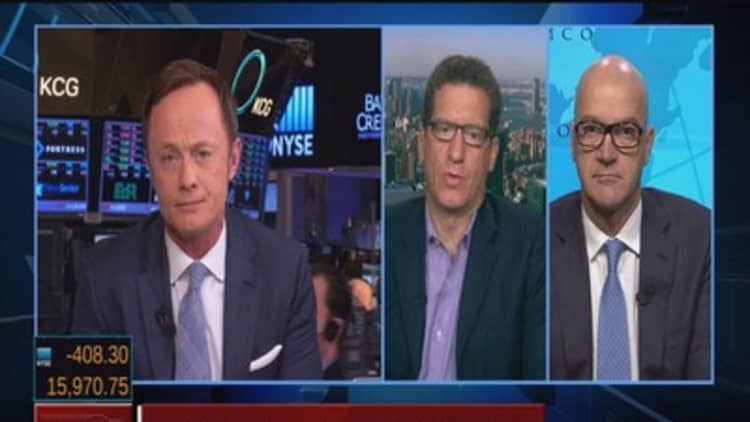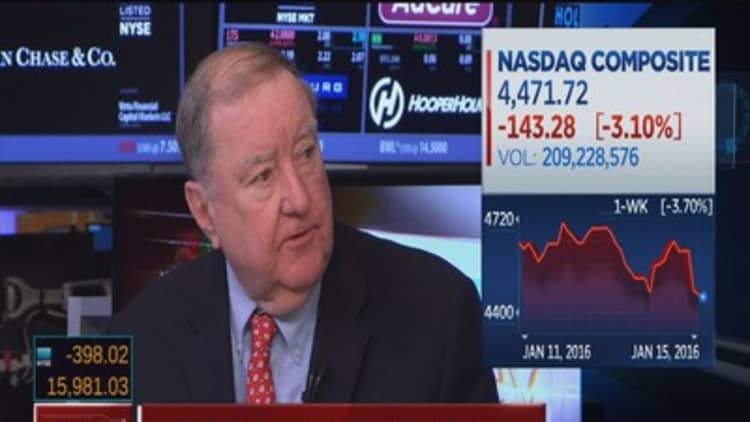


Data on Friday showed the economy clearly lost momentum in the fourth quarter, said Pimco global economic adviser Joachim Fels, but that has been evident for some time. Therefore, the depth of a morning sell-off in equity markets is not justified.
Following a batch of disappointing economic data, the Dow Jones industrial average briefly fell more than 400 points in morning trade to dip below the psychologically key 16,000 level. Stock market futures had already been in sell-off in early morning trading as indexes around the globally entered correction or bear market territory.
Fels acknowledged that a manufacturing sector recession and correction is spilling over into the broader economy. But he said the economy is still poised to reaccelerate on the back of decent job growth, low energy prices and a strong residential construction sector,
"I think we can still see something like 2 percent growth in U.S. this year, and therefore I think the markets are clearly exaggerating," he told CNBC's "Squawk on the Street."
Federal Reserve Bank of New York President William Dudley echoed that sentiment in a speech on Friday, saying recent data had been soft, but the economic situation has not changed substantially since the last meeting of the Federal Open Market Committee, during which the Fed raised interest rates for the first time in nearly a decade.
As a result, he said interest rates should continue to climb, he said.
Asked whether those comments were out of touch with financial conditions, Fels said he believes the Fed does not want to fuel pessimism, but instead wants to assess the situation at the next FOMC meeting this month.
While it's unlikely that the FOMC will increase rates four times as members have suggested, the markets expectations for just one rate hike is also unlikely, he said.
"I still think the Fed can squeeze in two to three rate hikes this year, but clearly we have to see an easing of financial conditions, or put differently, some rebounds in the markets, which I think we will get," he said.
But things could get worse before they get better, according to BlackRock CEO Larry Fink. Prior to the open of U.S. trade, Fink said stocks could fall another 10 percent.
"We're in the midst of a real market decline, bordering on a bear market," he told CNBC's "Squawk Box." "But the speed at which this is happening is just a reassessment of the risk, reassessment of where we're going."
David Bailin, global head of managed investments at Citi Private Bank, said that prospect is possible but the fundamental view doesn't support it.
"What we see is actually a small weakening … but we don't see the type of fundamental changes that would indicate that we have the level of concern that the market seems to think that we do," he told CNBC's "Squawk on the Street."
Citi's view is that consumer spending will not taper off significantly, and neither will residential construction fall off and stay low, he said.
In the current environment, Bailin said he see opportunity to buy stocks that are much cheaper, have strong dividend yields, and have good earnings prospects.
Art Cashin, UBS' director of floor operations at the New York Stock Exchange, cautioned against taking Friday's trade as an example, noting that the expiration of options is creating increased volatility.
The VIX, a measure of market volatility, briefly crossed above 30, the highest level since September.
"That shows you the amount of concern out there. I wouldn't want to say panic, but animated concern," Cashin told CNBC's "Squawk Alley."
Still, he said Fink's call for another 10 percent drop on top of the year's losses is in the right ballpark.
He pointed to the latest payroll report — which showed the United States added 292,000 jobs in December — as a sign the economy is not doing as well as recent data suggest. The high percentage of job gains among Americans under the age of 19 suggests that much of the gains can be chalked up to holiday hiring, he said.
"If you look down underneath the data, it's not quite as robust as you think."
— CNBC's Evelyn Cheng contributed to this story.




